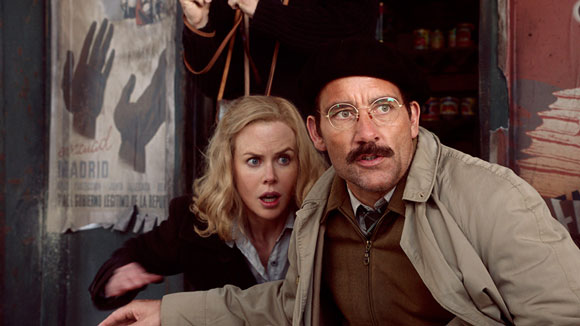Clive Owen and Nicole Kidman star in HBO Films’ Hemingway & Gellhorn, debuting on Monday, May 28th at 9pm ET/PT. Directed by Oscar nominee Philip Kaufman from a script by Jerry Stahl and Barbara Turner, Hemingway & Gellhorn tells the story of the passionate love affair and tumultuous marriage of Ernest Hemingway and war correspondent Martha Gellhorn.
The cast also includes David Strathairn, Rodrigo Santoro, Molly Parker, Parker Posey, Santiago Cabrera, Lars Ulrich, Saverio Guerra, Peter Coyote, Joan Chen and Tony Shalhoub.
The Plot:
1936: Ernest Hemingway [Clive Owen] falls under the spell of the beautiful novelist and assured magazine writer Martha Gellhorn [Nicole Kidman] when he first meets her in Sloppy Joe’s, a bar in Key West, Fla. They meet again in Spain, when she persuades a friend at Collier’s Weekly to give her credentials as a special correspondent, covering the Spanish Civil War and the attempt by Franco and the Fascists, with the aid of Hitler and Mussolini, to overthrow the democratically elected government. Hemingway has left behind his wife, Pauline [Molly Parker], and their two sons in Key West and has come to Spain to help his friends Joris Ivens [Lars Ulrich], John Dos Passos [David Strathairn] and Robert Capa [Santiago Cabrera] shoot the documentary “The Spanish Earth,” about the struggle to defeat Fascism. Gellhorn joins them.
Hemingway watches over and tutors Gellhorn, as the fledgling reporter discovers her voice and learns from him the essence of the Hemingway code of behavior: honor, courage, bravery and endurance in a life of stress, misfortune and pain. In short, grace under pressure. To Hemingway, having these qualities makes a man become a man and proves his worth. Gellhorn comes to embody these principles, perhaps even outdoing Hemingway. In a crucial situation where Gellhorn evidences her heroism, Hemingway is prompted to say, “She is the bravest woman I ever saw.”
Back from the war, Hemingway and Gellhorn settle in Cuba, where she finds the run-down villa Finca Vigia. There they begin a new life together.
Hemingway writes For Whom the Bell Tolls, which he dedicates to Gellhorn. When Collier’s offers her a job to cover the Russian invasion of Finland, Hemingway wants her to stay, but Gellhorn feels she must go and bear witness to the world’s upheaval. She later wrote, “I followed the war wherever I could reach it.”
Gellhorn longs to return to Hemingway and in their passionate correspondences the two of them vow that they will never leave each other again. She arrives home to find her beloved Finca Vigia in total disarray, strewn with Hemingway’s hangers-on. But a surprise awaits her as Hemingway proudly displays signed divorce papers from Pauline. Gellhorn, who never asked to be married, consents to becoming his third wife.
As the Japanese invade China, Gellhorn is offered an assignment to do an interview with the most powerful political couple in the world: Generalissimo Chiang Kai-shek [Larry Tse] and the “Empress of China,” Madame Chiang [Joan Chen]. After some cajoling by Gellhorn to look at it as a paid honeymoon, Hemingway reluctantly agrees to accompany her. While there, Hemingway and Gellhorn are taken blindfolded by boat to a secret meeting with Communist leader Chou En-lai [Anthony Brandon Wong], whom they find impressive and believe to be the wave of the future.
They report their findings to Gellhorn’s old friends, President Roosevelt and Eleanor Roosevelt, and the State Department swiftly brands Hemingway and Gellhorn “fellow travelers.” Hemingway is deeply stung by the charge of being unpatriotic and becomes increasingly agitated. Back in Cuba, Hemingway arms his boat, the Pilar, to patrol the Caribbean for Nazi U-boats, while carousing with his cronies. Gellhorn is restless, feeling isolated from the world-shaking events she longs to be a part of. They quarrel frequently. Hemingway wants a stay-at-home wife to share his bed, while she realizes that the greatest enemy of marriage is boredom. Gellhorn wants to cover the impending Allied invasion in Europe, but Hemingway selfishly compromises her assignment from Collier’s. Their marriage falls apart.
With no official press credential, the ever-resourceful Gellhorn manages to talk her way onto a hospital ship bound for Omaha Beach, becomes a stowaway and, disguised as a nurse, is among the first reporters on shore during the historic D-Day landing.
Meanwhile, in a London pub, Hemingwaymeets a woman named Mary Welsh [Parker Posey]. A drunken car accident lands him in the hospital and Gellhorn is called back from the front in France. She arrives to find a bandaged Hemingway entertaining his friends, with Welsh cozied up to him on his hospital bed. Hemingway asks Gellhorn sarcastically, “What are you doing here?” She responds, “I guess I just stopped by for a divorce.”
I want to be myself and alone and free to breathe, live, look upon the world and find it however it is…I want my own name back, most violently, as if getting it back would give me some of myself…And do not worry and do not feel badly. We are, basically, two tough people and we were born to survive.” – Martha Gellhorn
“If two people love each other, there can be no happy end to it.” – Ernest Hemingway
Hemingway’s life rapidly accelerated into paranoia and depression. Prior to his suicide in 1961, he was awarded the Nobel Prize for Literature. Following Hemingway’s death, history seemed to forget Gellhorn. She was relegated to being “the third Mrs. Hemingway,” a mere footnote in the great writer’s life. Undeterred, Gellhorn continued to cover all the major world conflicts, from the Dachau concentration camp, to the Vietnam War, the Six-Day War in the Middle East, the civil wars in Central America and, finally, at age 81, the U.S. invasion of Panama. She did not listen to “official drivel” and told the truth as she saw it. She was a pioneer. As the London Daily Telegraph wrote, Gellhorn was “one of the great war correspondents of the century; brave, fierce and wholly committed to the truth of the situation.”
Source: HBO






